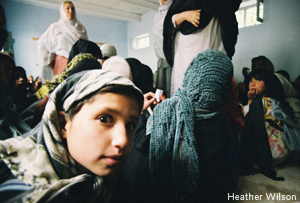Late last month, I traveled to Afghanistan as part of a delegation from the Dutch development agency Cordaid. I was there to update the findings of our report last year, Afghan Women Speak, and learn how the security transition and initial stages of Western troop withdrawal are affecting the prospects for peace and human rights.
Entering an active war zone quickens the pulse, but during our brief trip all was calm in Kabul. No attacks occurred in the city, although the steady pace of military operations continued in the provinces, as did reported drone strikes in Afghanistan and Pakistan.
Afghan national police and army troops are visible at many major intersections in Kabul. Amidst the city's dense traffic we saw a number of 'technicals,' Toyota pickups with 4 to 6 armed and uniformed Afghan men sitting in the back, holding automatic weapons and in some instances RPGs.
Only once did we feel vulnerable, while waiting outside the security entrance to a government ministry near the presidential palace, blast walls and guard towers outside all the buildings, our group of six civilians standing exposed on the side of a busy boulevard, warily watching the passing vehicles.
During interviews with more than a dozen Afghan women leaders, researchers, international aid workers and former Afghan government officials, we learned of persistent dangers and threats to the country's future.
- Afghan women face continuing repression. They are witnessing the erosion of previous gains as Taliban control spreads in the countryside and reactionary warlord influence increases within the Kabul regime. The government's own security forces are often responsible for violations of women's rights. Check back in a few days for a more detailed account of what we learned.
- The withdrawal of foreign forces will produce an economic crisis for the government of Afghanistan, which remains almost completely dependent financially on the U.S. and other foreign governments, especially to pay for its huge 300,000-person security forces. I wrote about this funding failure in an earlier post.
- A new security agreement between Kabul and Washington is likely to call for the continued presence of U.S. military forces in the country beyond the 2014 transition deadline. This is seen as necessary to provide security for Kabul, but it could also have the effect of prolonging the insurgency and impeding prospects for reconciliation.
It was clear from what we heard that maintaining security requires more than deploying a large number of troops. It also requires proper governance, functioning courts, the rule of law, and an end to the impunity and abuse perpetrated by Afghan government officials and security forces. If the Afghan people cannot trust their government, no amount of military force will be able to assure genuine security and stability.
David Cortright, a Sojourners contributing writer, is director of policy studies at Notre Dame's Kroc Institute for International Peace Studies. David is author of Ending Obama's War: Responsible Military Withdrawal from Afghanistan and blogs at DavidCortright.net.
Got something to say about what you're reading? We value your feedback!
